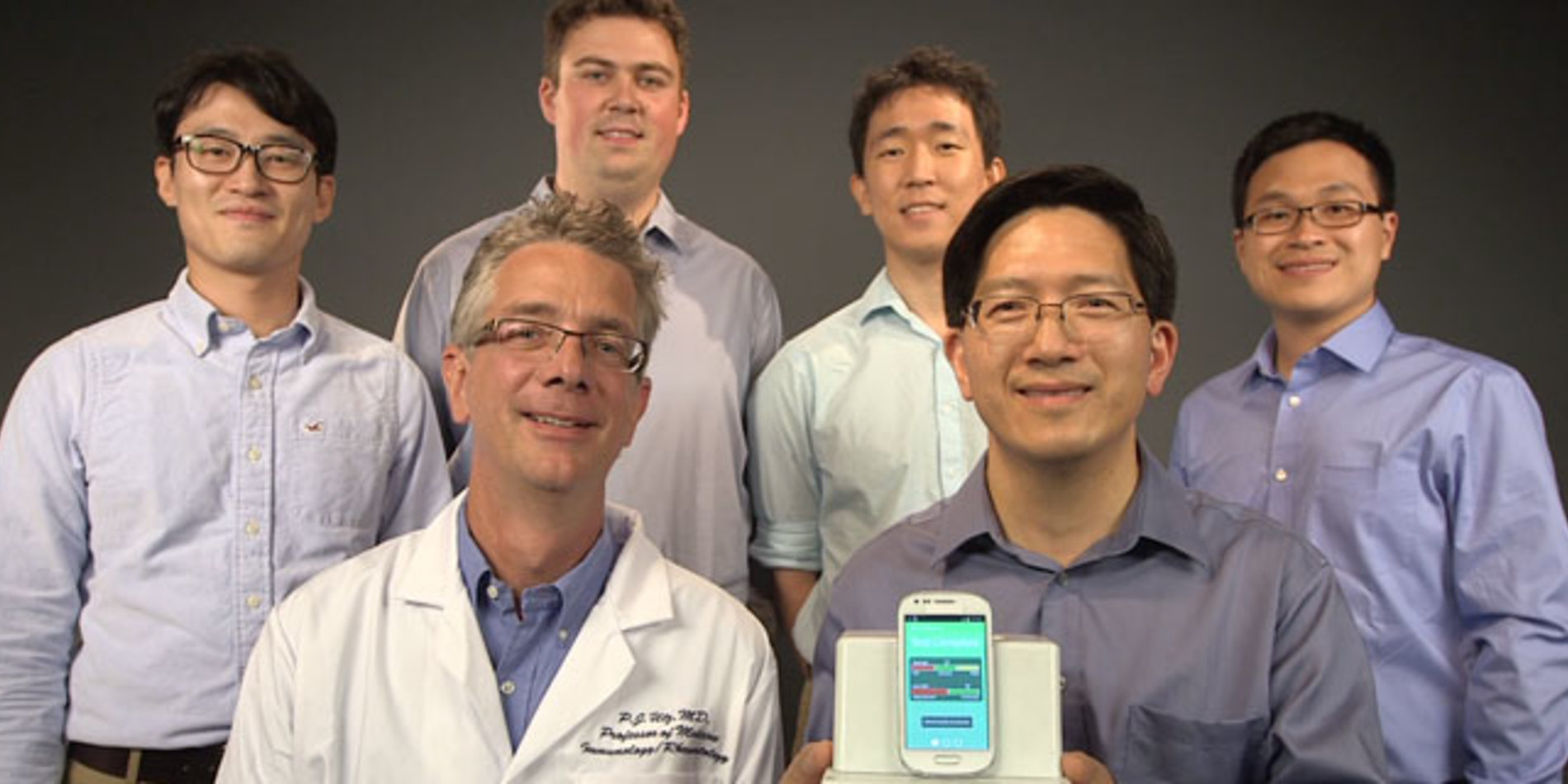Stanford team wins award for experimental blood test device
A team of Stanford University students and faculty has been selected as one of five Distinguished Award Prize winners in the Nokia Sensing XCHALLENGE, a global competition to catalyze breakthrough medical sensing technologies that will ultimately enable faster diagnoses and easier personal health monitoring.
The Stanford team was recognized for developing a hepatitis B blood test that can be analyzed in minutes using the microprocessor in a smart phone.
With this honor comes a $120,000 cash prize, most of which will be put back into research, according to Shan Wang, a professor of materials science and engineering. Wang, who holds a joint appointment in electrical engineering, joined Paul J. Utz, a professor of immunology at Stanford Medical School, to lead the student team.
The mobile-device-based test was designed for use in developing countries, where vaccination or timely treatments are not available, as team members explain in a video about the invention.
A Stanford team has created a portable device that can detect hepatitis B infections in minutes. (Video: Eigen Lifesciences)
“If a mother is infected with hepatitis B, the child has to be treated within 12 hours,” said Wang, who collaborates with Utz and other researchers.
The current prize recognizes a 12-month effort by four PhD students – mechanical engineers Daniel Bechstein and Jung-Rok Lee, and electrical engineers Joohong Choi and Adi W. Gani – to create a mobile version of a technology that Wang and other Stanford researchers have been developing for years.
In essence, the researchers graft magnetic nanoparticles onto biological markers. In this case they are interested in two biomarkers. One is the hepatitis B virus, called the antigen. The other is the antibody that fights hepatitis B. The magnetic particles are the homing beacons that allow instruments to track these biomarkers.
For the Nokia Sensing XCHALLENGE, the students used a diagnostic strip that takes a finger prick of blood. The patient’s blood flows into a tiny chamber where it mixes with magnetic nanoparticles to form magnetically tagged biomarkers.
The test strip is inserted into a small magnetic detector. This is a mobile version of a technology that Stanford researchers are developing for hospitals. The smartphone is plugged into the detector, and its microprocessor helps to perform the test. It takes only a few minutes.
If the test finds the hepatitis B antigen in the blood, the patient is infected and needs treatment. For a newborn with an infected mother, the child needs both vaccination and antibody therapy.
The mobile hepatitis B test is still experimental and is just one part of a larger, on-going effort to use this same approach to test for HIV, heart disease and other conditions that leave tell tale evidence in the blood.
To enter this competition, the students and faculty created Eigen Lifescience, a company that today exists only as a Facebook page but which may one day become a real company. “Eigen” means self in German and they chose the name to symbolize self-testing with a mobile phone. Matthew Frank with the Skippy Frank Translational Research Fund donated $25,000 to help support the team’s entry into the competition.
The team also benefited greatly from interdisciplinary collaborations with the Center for Cancer Nanotechnology Excellence led by Drs. Sam Gambhir and Wang; the Asian Liver Center led by Dr. Sam So; the Physical Science Oncology Center; the Stanford Bio-X program; and many others.
The Stanford team was one of 90 competitors from four countries whose work was reviewed earlier this month by a judging panel composed of digital health and medical industry experts.
The Nokia Sensing XCHALLENGE is managed by XPRIZE, an organization solving the world’s grand challenges by creating and overseeing prizes in five areas: learning, exploration, energy and environment, global development, and life sciences.



